MercoPress. South Atlantic News Agency
Tag: Ibovespa stock index
-
Thursday, January 23rd 2025 - 08:59 UTC
Brazil: Dollar plunges to lowest level since November
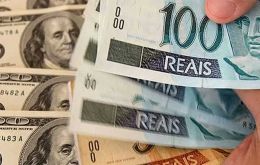
The US dollar fell Wednesday below R$ 6 following Donald Trump's second inauguration this week in Washington DC, thus reaching its lowest level since November. Meanwhile, the stock market fell for the first time after three straight rises. The commercial dollar closed Wednesday at R$ 5.946 after hitting R$ 5.91 around 2 pm. So far this year, the US dollar went down by 3.79%.
-
Thursday, January 3rd 2019 - 07:29 UTC
Bolsonaro effect on Brazilian markets and currency
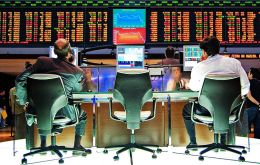
A record high for Brazil shares and a more than 2% gain in the Real, spurred by positive policy moves by the country's new government, helped Latin American markets make a strong start to the New Year and buck gloom in global markets on Wednesday.
-
Thursday, June 28th 2018 - 11:57 UTC
Black Wednesday for Argentina and Brazil as selloff intensifies across emerging markets assets
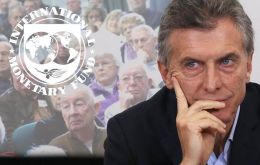
Argentina’s benchmark MerVal stock index closed down 8.8% on Wednesday, its worst daily performance since early 2014, as concerns about trade tensions between the United States and China prompted a selloff across emerging market assets.
-
Friday, December 29th 2017 - 10:06 UTC
Brazil's main stock market, Ibovespa ends the year with a 26.85% increase
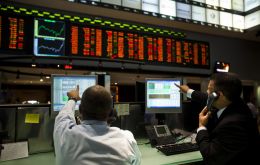
Ibovespa, the benchmark stock market index in Brazil, ended the last trading session of the year with a 0.43% rise to 76,402.08 points amid a lack of negative political news and tracking stock markets abroad.
-
Tuesday, May 10th 2016 - 06:56 UTC
Brazil's political adrift situation shocks markets but is a plum day for speculators

Brazilian markets weakened on Monday after the acting lower house speaker in Brazil's Congress annulled an impeachment vote, though losses were pared as investors bet the move would delay rather than prevent leftist President Dilma Rousseff's removal from office.
-
Thursday, February 18th 2016 - 06:57 UTC
S&P sends Brazil's credit rating deeper into junk territory; officials 'surprised'
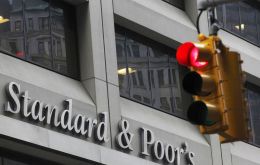
Standard & Poor's downgraded Brazil's credit rating deeper into junk territory on Wednesday, citing its failure to curb its fiscal deficit, in a surprise blow to President Dilma Rousseff`s bid to haul the economy out of its worst recession in decades.
-
Friday, September 25th 2015 - 07:17 UTC
Brazil's Real recovers ground after Central bank promises to use all 'instruments available'
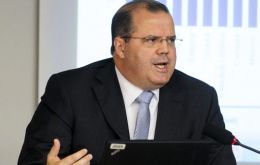
Brazil's depressed currency rebounded Thursday after the head of its central bank vowed to use all instruments in its arsenal to curtail the Real's collapse. Earlier in the day the Real tumbled to an all-time low of 4.248 to the U.S. dollar, but bounced back to 4.023 after central bank President Alexandre Tombini, in an unscheduled press briefing, did not rule out selling part of the country's $371 billion foreign reserves to calm the exchange rate market.
-
Wednesday, December 17th 2014 - 00:53 UTC
Brazil's real sinks against US dollar to lowest rate in 10 years

The currency closed at R$ 2.76 per US$ 1 dollar. Domestic politics, international oil prices, US Fed measures and Russian ruble drop to blame.
-
Tuesday, October 28th 2014 - 06:47 UTC
Brazil's markets react negatively to Rousseff's re-election; waiting for new finance minister name
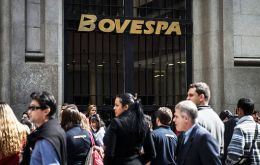
A sharp drop in Brazil’s financial markets signalled investors are unsure whether the newly re-elected President Dilma Rousseff will take the necessary steps to reinvigorate the country’s stalled economy.
-
Saturday, October 4th 2014 - 10:38 UTC
Investors on edge waiting for the results of Sunday's voting in Brazil

Latin American currencies weakened on Friday after strong U.S. jobs data was seen as increasing the likelihood of higher interest rates in the world's largest economy, while Brazil markets fluttered in the last trading session before Oct. 5 elections.
